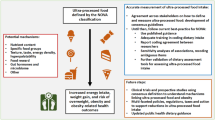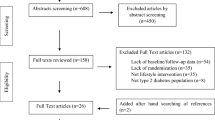Abstract
A Mediterranean-style diet has long been propounded to confer substantial health-promoting effects, particularly those relating to cardiovascular disease. The diet itself represents a concept that varies across the Mediterranean region but is characterized by relatively high intakes of olive oil, legumes, fruits and vegetables, unrefined cereals, fish, and red wine—all of which are purported to be beneficial at reducing cardiometabolic risk. Most of the evidence to date on the effects of the Mediterranean diet has come from large prospective cohort studies, clinical feeding studies, and small randomized trials of the effects of different components of the diet on cardiovascular and metabolic risk factors. In recent years there have been several meta-analyses published that have attempted to aggregate the large amounts of data on the topic and the first randomized trial of the effects of the Mediterranean diet on cardiovascular outcomes in a primary care setting. The findings from these studies will be discussed as so will the most recent evidence as to the biological mechanisms that may underpin the association between the Mediterranean diet and cardiovascular risk.

Similar content being viewed by others
References
Lloyd-Jones DM, Hong Y, Labarthe D, Mozaffarian D, Appel LJ, Van Horn L, et al. American Heart Association Strategic Planning Task Force and Statistics Committee. Defining and setting national goals for cardiovascular health promotion and disease reduction: the American Heart Association's strategic impact goal through 2020 and beyond. Circulation. 2010;121:586–613.
National Institute for Health and Clinical Excellence. Issue date: MI: secondary prevention. Secondary prevention in primary and secondary care for patients following a myocardial infarction. May 2007. Available at: http://www.nice.org.uk/nicemedia/pdf/CG48NICEGuidance.pdf. Accessed 3 Oct 2013.
Keys A, Aravanis C, Blackburn HW, Van Buchem FS, Buzina R, Djordjević BD, et al. Epidemiological studies related to coronary heart disease: characteristics of men aged 40–59 in seven countries. Acta Med Scand Suppl. 1966;460:1–392.
Willett WC, Sacks F, Trichopoulou A, Drescher G, Ferro-Luzzi A, Helsing E, et al. Mediterranean diet pyramid: a cultural model for healthy eating. Am J Clin Nutr. 1995;61:1402S–6S.
Keys A, Menotti A, Karvonen MJ, et al. The diet and 15-year death rate in the seven countries study. Am J Epidemiol. 1986;124:903–15.
Ortega R. Importance of functional foods in the Mediterranean diet. Public Health Nutr. 2006;9:1136–40.
Hu FB. Dietary pattern analysis: a new direction in nutritional epidemiology. Curr Opin Lipidol. 2002;12:3–9.
Hoevenaar-Blom MP, Nooyens AC, Kromhout D, Spijkerman AM, Beulens JW, van der Schouw YT, et al. Mediterranean style diet and 12-year incidence of cardiovascular diseases: the EPIC-NL cohort study. PLoS One. 2012;7:e45458.
Gardener H, Wright CB, Gu Y, Demmer RT, Boden-Albala B, Elkind MS, et al. Mediterranean-style diet and risk of ischemic stroke, myocardial infarction, and vascular death: the Northern Manhattan Study. Am J Clin Nutr. 2011;94:1458–64.
Kastorini CM, Milionis HJ, Esposito K, Giugliano D, Goudevenos JA, Panagiotakos DB. The effect of Mediterranean diet on metabolic syndrome and its components: a meta-analysis of 50 studies and 534,906 individuals. J Am Coll Cardiol. 2011;57:1299–313.
Sofi F, Abbate R, Gensini GF, Casini A. Accruing evidence on benefits of adherence to the Mediterranean diet on health: an updated systematic review and meta-analysis. Am J Clin Nutr. 2010;92:1189–96.
Estruch R, Ros E, Salas-Salvadó J, Covas MI, Corella D, Arós F, et al. PREDIMED Study Investigators. Primary prevention of cardiovascular disease with a Mediterranean diet. N Engl J Med. 2013;368:1279–90.
Mensink RP, Zock PL, Kester AD, Katan MB. Effects of dietary fatty acids and carbohydrates on the ratio of serum total to HDL cholesterol and on serum lipids and apolipoproteins: a meta-analysis of 60 controlled trials. Am J Clin Nutr. 2003;77:1146–55.
Brown L, Rosner B, Willett WW, Sacks FM. Cholesterol-lowering effects of dietary fiber: a meta-analysis. Am J Clin Nutr. 1999;69:30–42.
Anderson JW, Major AW. Pulses and lipaemia, short- and long-term effect: potential in the prevention of cardiovascular disease. Br J Nutr. 2002;88 Suppl 3:S263–71.
Estruch R, Martínez-González MA, Corella D, et al. PREDIMED Study Investigators. Effects of a Mediterranean-style diet on cardiovascular risk factors: a randomized trial. Ann Intern Med. 2006;145:1–11.
Murphy KJ, Meyer BJ, Mori TA, et al. Impact of foods enriched with n-3 long-chain polyunsaturated fatty acids on erythrocyte n-3 levels and cardiovascular risk factors. Br J Nutr. 2007;97:749–57.
Escurriol V, Cofán M, Serra M, et al. Serum sterol responses to increasing plant sterol intake from natural foods in the Mediterranean diet. Eur J Nutr. 2009;48:373–82. doi:10.1007/s00394-009-0024-z.
Kris-Etherton PM, Hu FB, Ros E, Sabaté J. The role of tree nuts and peanuts in the prevention of coronary heart disease: multiple potential mechanisms. J Nutr. 2008;138:1746S–51S.
Griel AE, Kris-Etherton PM. Tree nuts and the lipid profile: a review of clinical studies. Br J Nutr. 2006;96 Suppl 2:S68–78.
D'Elia L, Barba G, Cappuccio FP, Strazzullo P. Potassium intake, stroke, and cardiovascular disease a meta-analysis of prospective studies. J Am Coll Cardiol. 2011;57:1210–9. doi:10.1016/j.jacc.2010.09.070. Review.
Joosten MM, Gansevoort RT, Mukamal KJ, et al. PREVEND Study Group. Urinary magnesium excretion and risk of hypertension: the prevention of renal and vascular end-stage disease study. Hypertension. 2013;61:1161–7. doi:10.1161/HYPERTENSIONAHA.113.01333.
Joosten MM, Gansevoort RT, Mukamal KJ, et al. PREVEND Study Group. Urinary and plasma magnesium and risk of ischemic heart disease. Am J Clin Nutr. 2013;97:1299–306. doi:10.3945/ajcn.112.054114.
Aburto NJ, Hanson S, Gutierrez H, Hooper L, Elliott P, Cappuccio FP. Effect of increased potassium intake on cardiovascular risk factors and disease: systematic review and meta-analyses. BMJ. 2013;346:f1378. doi:10.1136/bmj.f1378.
Beilin LJ, Burke V. Vegetarian diet components, protein and blood pressure: which nutrients are important? Clin Exp Pharmacol Physiol. 1995;22:195–8.
Esposito K, Marfella R, Ciotola M, et al. Effect of a Mediterranean-style diet on endothelial dysfunction and markers of vascular inflammation in the metabolic syndrome: a randomized trial. JAMA. 2004;292:1440–6.
Casas-Agustench P, López-Uriarte P, Ros E, Bulló M, Salas-Salvadó J. Nuts, hypertension and endothelial function. Nutr Metab Cardiovasc Dis. 2011;21 Suppl 1:S21–33. doi:10.1016/j.numecd.2011.01.009.
Bao DQ, Mori TA, Burke V, Puddey IB, Beilin LJ. Effects of dietary fish and weight reduction on ambulatory blood pressure in overweight hypertensives. Hypertension. 1998;32:710–7.
Theobald HE, Goodall AH, Sattar N, et al. Low-dose docosahexaenoic acid lowers diastolic blood pressure in middle-aged men and women. J Nutr. 2007;137:973–8.
Medina-Remón A, Vallverdú-Queralt A, Arranz S, et al. Gazpacho consumption is associated with lower blood pressure and reduced hypertension in a high cardiovascular risk cohort. Cross-sectional study of the PREDIMED trial. Nutr Metab Cardiovasc Dis. 2012. doi:10.1016/j.numecd.2012.07.008.
Shai I, Schwarzfuchs D, Henkin Y, et al. Dietary Intervention Randomized Controlled Trial [DIRECT] group weight loss with a low-carbohydrate, Mediterranean, or low-fat diet. N Engl J Med. 2008;359:229–41. doi:10.1056/NEJMoa0708681.
Esposito K, Maiorino MI, Ciotola M, et al. Effects of a Mediterranean-style diet on the need for antihyperglycemic drug therapy in patients with newly diagnosed type 2 diabetes: a randomized trial. Ann Intern Med. 2009;151:306–14.
Casas-Agustench P, López-Uriarte P, Bulló M, et al. Effects of one serving of mixed nuts on serum lipids, insulin resistance and inflammatory markers in patients with the metabolic syndrome. Nutr Metab Cardiovasc Dis. 2011;21:126–35. doi:10.1016/j.numecd.2009.08.005.
Mukuddem-Petersen J, Stonehouse Oosthuizen W, Jerling JC, et al. Effects of a high walnut and high cashew nut diet on selected markers of the metabolic syndrome: a controlled feeding trial. Br J Nutr. 2007;97:1144–53.
Estruch R, Ros E, Salas-Salvadó J, Covas MI, et al. PREDIMED Study Investigators. Primary prevention of cardiovascular disease with a Mediterranean diet. N Engl J Med. 2013;368:1279–90. doi:10.1056/NEJMoa1200303.
Fitó M, Guxens M, Corella D, et al. PREDIMED Study Investigators. Effect of a traditional Mediterranean diet on lipoprotein oxidation: a randomized controlled trial. Arch Intern Med. 2007;167:1195–203.
Zamora-Ros R, Urpi-Sarda M, Lamuela-Raventós RM, et al. High urinary levels of resveratrol metabolites are associated with a reduction in the prevalence of cardiovascular risk factors in high-risk patients. Am J Clin Nutr. 2009;90:1329–35. doi:10.3945/ajcn.2009.27718.
Schröder H, de la Torre R, Estruch R, et al. PREDIMED Study Investigators. Alcohol consumption is associated with high concentrations of urinary hydroxytyrosol. Am J Clin Nutr. 2009;90:1329–35. doi:10.3945/ajcn.2009.27718.
Urpi-Sarda M, Casas R, Chiva-Blanch G, et al. Virgin olive oil and nuts as key foods of the Mediterranean diet effects on inflammatory biomarkers related to atherosclerosis. Pharmacol Res. 2012;65:577–83. doi:10.1016/j.phrs.2012.03.006.
Jiménez-Gómez Y, López-Miranda J, Blanco-Colio LM, et al. Olive oil and walnut breakfasts reduce the postprandial inflammatory response in mononuclear cells compared with a butter breakfast in healthy men. Atherosclerosis. 2009;204:e70–6. doi:10.1016/j.atherosclerosis.2008.09.011.
Inaba Y, Chen JA, Bergmann SR. Prediction of future cardiovascular outcomes by flow-mediated vasodilatation of brachial artery: a meta-analysis. Int J Cardiovasc Imaging. 2010;26:631–40. doi:10.1007/s10554-010-9616-1.
Keogh JB, Grieger JA, Noakes M, Clifton PM. Flow-mediated dilatation is impaired by a high-saturated fat diet but not by a high-carbohydrate diet. Arterioscler Thromb Vasc Biol. 2005;25:1274–9.
Fuentes F, López-Miranda J, Pérez-Martínez P, et al. Chronic effects of a high-fat diet enriched with virgin olive oil and a low-fat diet enriched with alpha-linolenic acid on postprandial endothelial function in healthy men. Br J Nutr. 2008;100:159–65. doi:10.1017/S0007114508888708.
Ruano J, Lopez-Miranda J, Fuentes F, et al. Phenolic content of virgin olive oil improves ischemic reactive hyperemia in hypercholesterolemic patients. J Am Coll Cardiol. 2005;46:1864–8.
Moreno-Luna R, Muñoz-Hernandez R, Miranda ML, et al. Olive oil polyphenols decrease blood pressure and improve endothelial function in young women with mild hypertension. Am J Hypertens. 2012;25:1299–304. doi:10.1038/ajh.2012.128.
Pacheco YM, Bemúdez B, López S, et al. Minor compounds of olive oil have postprandial anti-inflammatory effects. Br J Nutr. 2007;98:260–3.
Pacheco YM, López S, Bermúdez B, et al. A meal rich in oleic acid beneficially modulates postprandial sICAM-1 and sVCAM-1 in normotensive and hypertensive hypertriglyceridemic subjects. J Nutr Biochem. 2008;19:200–5.
Karatzi K, Papamichael C, Karatzis E, et al. Postprandial improvement of endothelial function by red wine and olive oil antioxidants: a synergistic effect of components of the Mediterranean diet. J Am Coll Nutr. 2008;27:448–53.
Rueda-Clausen CF, Silva FA, Lindarte MA, et al. Olive, soybean and palm oils intake have a similar acute detrimental effect over the endothelial function in healthy young subjects. Nutr Metab Cardiovasc Dis. 2007;17:50–7.
Ros E, Núñez I, Pérez-Heras A, et al. A walnut diet improves endothelial function in hypercholesterolemic subjects: a randomized crossover trial. Circulation. 2004;109:1609–14.
Cortés B, Núñez I, Cofán M, et al. Acute effects of high-fat meals enriched with walnuts or olive oil on postprandial endothelial function. J Am Coll Cardiol. 2006;48:1666–71.
Loke WM, Hodgson JM, Proudfoot JM, McKinley AJ, Puddey IB, Croft KD. Pure dietary flavonoids quercetin and [−]-epicatechin augment nitric oxide products and reduce endothelin-1 acutely in healthy men. Am J Clin Nutr. 2008;88:1018–25.
Compliance with Ethics Guidelines
Conflict of Interest
Rachel R. Huxley declares that she has no conflict of interest. Peter Clifton declares that he has no conflict of interest.
Human and Animal Rights and Informed Consent
This article does not contain any studies with human or animal subjects performed by any of the authors.
Author information
Authors and Affiliations
Corresponding author
Rights and permissions
About this article
Cite this article
Huxley, R.R., Clifton, P. Mediterranean Diet and Cardiovascular Risk – Are We There Yet?. Curr Cardiovasc Risk Rep 7, 520–526 (2013). https://doi.org/10.1007/s12170-013-0346-5
Published:
Issue Date:
DOI: https://doi.org/10.1007/s12170-013-0346-5




